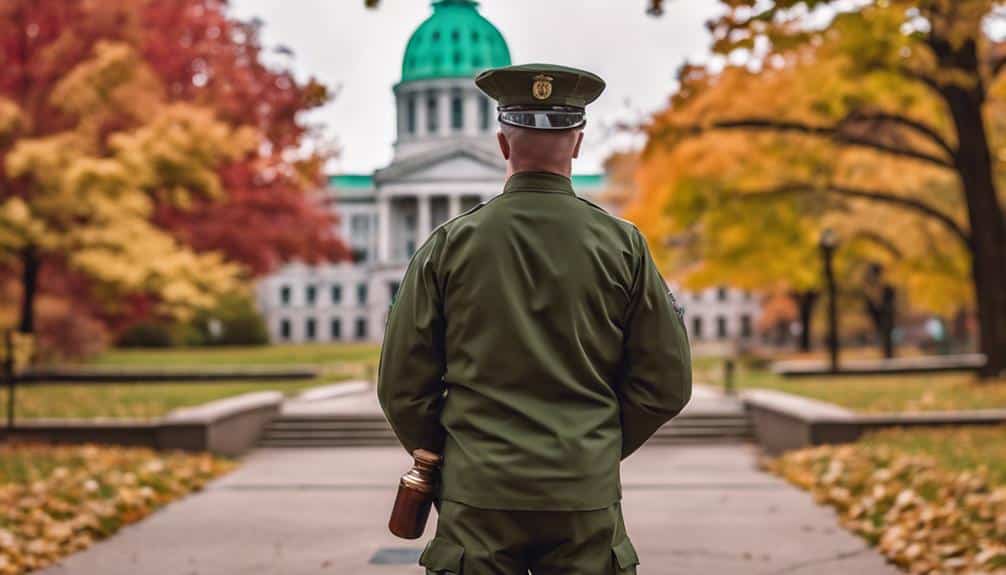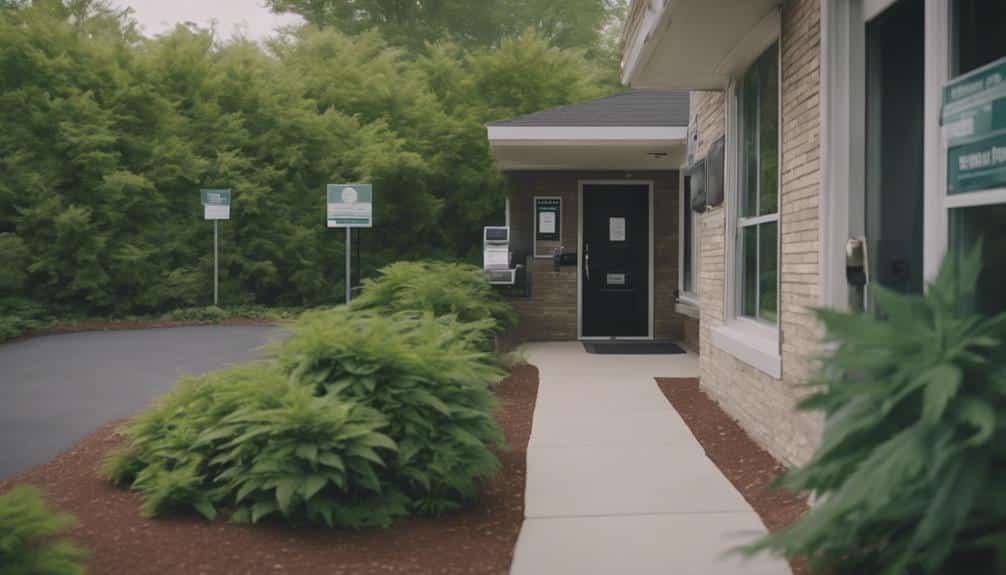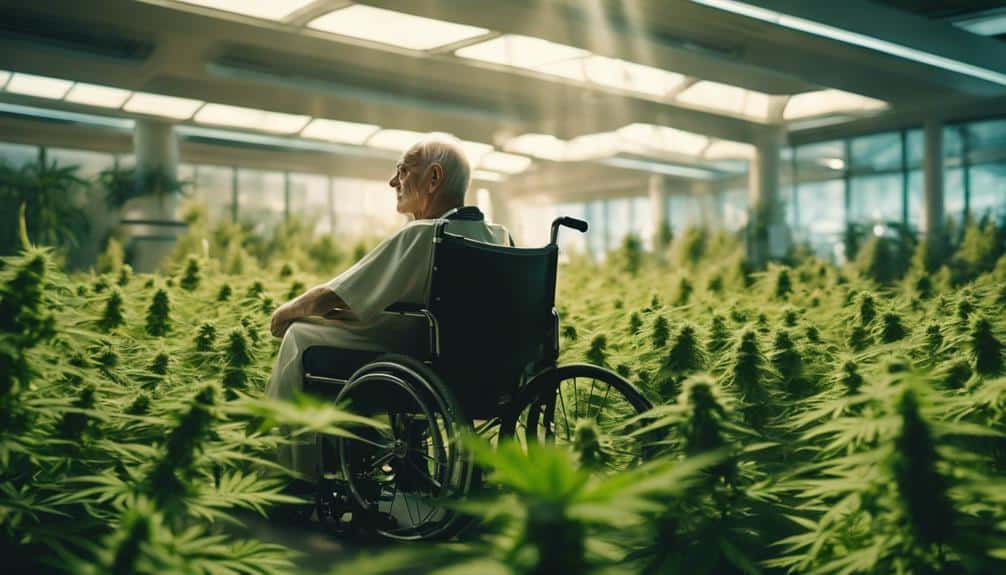Have you ever wondered how Delaware is addressing the unique healthcare needs of its veterans? The state’s new initiatives for medical marijuana could be a game-changer, particularly for those grappling with PTSD and chronic pain. You’ll find that Delaware is not only expanding access but also tailoring benefits specifically for veterans. With state-approved dispensaries and delivery services, the program guarantees safe and reliable access. Curious about how these changes could impact the lives of veterans and what the future holds for these initiatives? Let’s explore the details and implications together.
Table of Contents
Legislative Background

The legislative background of medical marijuana for veterans involves a complex history of federal and state regulations. Understanding this history is essential for anyone aiming to serve those who’ve served us.
The federal stance on cannabis has long been one of prohibition, classifying it as a Schedule I substance under the Controlled Substances Act of 1970. This classification means that at the federal level, cannabis is considered to have no accepted medical use and a high potential for abuse.
Historically, this federal stance has created significant barriers for veterans seeking medical marijuana as a treatment option. Despite ongoing advocacy from veteran groups and some lawmakers, federal policy remains unchanged.
However, the historical context also includes a growing acceptance of medical marijuana at the state level. Many states have enacted their own medical marijuana programs which often include provisions specifically designed to assist veterans.
States like Delaware have recognized the potential benefits of medical marijuana, leading to new initiatives that seek to provide veterans with access to this alternative form of treatment.
Qualifying Conditions
When considering medical marijuana for veterans, it’s important to identify the qualifying conditions that make them eligible for this form of treatment. In Delaware, veterans can access medical marijuana if they suffer from specific conditions like PTSD and chronic pain. These conditions are prevalent among veterans, making access to alternative treatments significant.
For PTSD treatment, medical marijuana has shown promise in alleviating symptoms such as anxiety, insomnia, and nightmares. Veterans dealing with PTSD often find traditional treatments inadequate and medical marijuana offers a potential option that can improve their quality of life. Research suggests that cannabinoids can help regulate mood and stress responses, providing much-needed relief.
Chronic pain is another common issue for veterans often resulting from injuries sustained during service. Traditional pain management methods including opioids can have severe side effects and addiction risks. Medical marijuana provides a safer alternative with fewer adverse effects. It can help manage pain through its anti-inflammatory and analgesic properties making daily activities more manageable for veterans.
Understanding these qualifying conditions is important for ensuring veterans receive the appropriate care they deserve. By recognizing the potential benefits of medical marijuana for PTSD treatment and chronic pain you can better advocate for the well-being of those who’ve served.
Application Process

The application process for medical marijuana involves several important steps to ensure veterans receive the treatment they need.
First, you’ll need to gather medical records that confirm your qualifying condition. Next, schedule an appointment with a physician registered with Delaware’s medical marijuana program. They’ll evaluate your medical history and determine if medical marijuana is appropriate for your condition.
Once you have a physician’s recommendation, you’ll have to complete the application form available on Delaware’s official medical marijuana program website. Be prepared to pay the application fees which are necessary to process your request. It’s crucial to submit all required paperwork to avoid any delays.
After submission, adhere to the specified application timelines. Typically, the review process can take several weeks so it’s important to apply as early as possible. You can check the status of your application online to stay informed about its progress.
Following approval, you’ll receive a medical marijuana identification card allowing you to purchase medical marijuana from authorized dispensaries.
This structured process ensures that veterans get access to the treatment they need in a timely and efficient manner.
Veteran-Specific Benefits
Upon receiving your medical marijuana identification card veterans can access several unique benefits tailored for their specific needs. One major advantage is the potential for significant mental health improvements. Research has indicated that medical marijuana can alleviate symptoms of PTSD anxiety and depression all conditions that disproportionately affect veterans. By integrating medical cannabis into your treatment plan you may experience a reduction in these debilitating symptoms leading to an enhanced quality of life.
In addition to mental health advantages, medical marijuana provides effective pain relief. Chronic pain is a common issue among veterans often resulting from service-related injuries. Unlike traditional pain medications which can carry significant risks of dependency and adverse side effects, medical marijuana offers a safer alternative. Studies have shown that cannabinoids, the active compounds in cannabis interact with the body’s endocannabinoid system to reduce pain and inflammation.
Furthermore, veterans may also benefit from targeted support programs and resources that accompany medical marijuana use. These programs often include educational workshops peer support groups and personalized consultations all designed to ensure you’re maximizing your medical marijuana treatment. By leveraging these veteran-specific benefits you can address both mental and physical health challenges more effectively.
Access Points

Veterans can access medical marijuana through various state-approved dispensaries and healthcare providers. Delaware has established several dispensary locations across the state to guarantee you can find one convenient for you. These dispensaries are regulated and staffed with knowledgeable professionals who can assist you through the process of selecting the appropriate medical marijuana products for your needs.
In addition to physical dispensary locations, Delaware also offers delivery services for veterans who may have difficulty traveling. This service guarantees that you can receive your medical marijuana without leaving your home providing a significant benefit for those with mobility issues or those living in rural areas.
Delivery services are conducted by licensed providers who comply with state regulations ensuring that your medication is handled with care and delivered safely.
Safety and Regulations
To ensure your access to medical marijuana is both safe and compliant with state laws Delaware has implemented stringent safety and regulatory measures. The state prioritizes patient education ensuring you’re well-informed about dosage potential side effects, and interactions with other medications. This education is vital for making informed decisions regarding your treatment.
Regulatory compliance is at the heart of Delaware’s approach. Dispensaries must adhere to strict guidelines for product testing labeling and packaging. This means the medical marijuana you obtain undergoes thorough quality control to verify its potency and purity. You can trust that what’s prescribed meets the highest standards.
Another important aspect is secure patient data management. Delaware enforces regulations that protect your personal information and medical history ensuring confidentiality and preventing misuse. The state also requires dispensaries to maintain accurate records which helps in monitoring and improving the medical marijuana program.
In addition to these measures, Delaware mandates regular inspections of dispensaries and cultivation facilities. These inspections guarantee that the facilities comply with cleanliness and operational standards safeguarding your health and well-being. By adhering to these robust safety and regulatory protocols, Delaware aims to provide a reliable and safe medical marijuana program for veterans like you.
Community Support

In addition to regulatory measures strong community support networks play an important role in helping veterans navigate their medical marijuana treatment. You can be part of this essential support system by participating in or organizing support groups specifically tailored for veterans.
These groups provide a safe space for veterans to share their experiences challenges, and successes related to medical marijuana. Support groups can help reduce feelings of isolation, offer emotional support, as well as practical assistance.
Outreach programs also make a significant impact. By volunteering or contributing to such initiatives you help ensure veterans have access to reliable information and resources. Outreach programs often include educational workshops personalized consultations and assistance with understanding legal and medical systems. These efforts can help veterans make informed decisions about their treatment options.
Evidence shows that community engagement can enhance treatment outcomes. According to a study published in the Journal of Psychoactive Drugs, veterans who participated in group support reported higher levels of satisfaction with their treatment plans.
As a result, your involvement in these community support networks not only benefits individual veterans but also strengthens the overall effectiveness of medical marijuana initiatives in Delaware. By serving others you contribute to building a supportive and informed community.
Case Studies
Although each veteran’s experience with medical marijuana is unique case studies provide valuable insights into the diverse ways this treatment can improve their quality of life. For instance consider a Delaware veteran suffering from chronic pain and PTSD. After traditional treatments failed he turned to medical marijuana. His patient testimonial reveals significant pain reduction and improved sleep quality leading to a better overall mood and functionality.
Another case study involves a female veteran with severe anxiety and depression. Standard medications didn’t offer lasting relief but medical marijuana greatly mitigated her symptoms. Her treatment outcomes included reduced anxiety levels and an enhanced ability to engage in daily activities which she hadn’t experienced in years.
These case studies highlight the transformative potential of medical marijuana for veterans. By examining patient testimonials and treatment outcomes we can see a pattern of improved physical and mental health.
In Delaware such evidence is vital for shaping new initiatives and policies aimed at veteran care. When you read these stories you’re not just looking at isolated successes; you’re seeing the broader impact of an evolving treatment landscape that prioritizes the well-being of those who’ve served.
Future Prospects

Looking ahead the future prospects for medical marijuana in veteran care seem promising as ongoing research and policy changes continue to expand its accessibility and effectiveness. You can expect advancements in scientific studies to provide more robust evidence supporting the benefits of medical marijuana for conditions like PTSD and chronic pain common among veterans. As research solidifies these findings it will likely influence both state and federal policy making medical marijuana more accessible for those who need it most.
Federal policy changes could also play a significant role in shaping the future landscape. If federal restrictions on marijuana are loosened you might see a more uniform approach to its medical use across states including Delaware. This could simplify the process for veterans seeking treatment reducing bureaucratic hurdles and enhancing care quality.
Moreover, the economic impact of integrating medical marijuana into veteran care can’t be overlooked. Increased accessibility could lead to reduced healthcare costs by offering a viable alternative to expensive pharmaceuticals and invasive treatments. Additionally, it could spur job creation and generate tax revenue benefiting the broader community.
The future indeed holds promising prospects for integrating medical marijuana into veteran care driven by evidence-based research and evolving policies.
Conclusion
To sum up, Delaware’s initiatives to provide veterans with access to medical marijuana are proving to be a game-changer. With over 70% of veterans reporting significant pain relief from medical cannabis it’s clear these programs are making a difference.
By ensuring veteran-specific benefits safe access points, rigorous safety regulations Delaware isn’t just addressing medical needs but also enhancing the quality of life for its veteran community. The future looks promising as these efforts continue to evolve.
If you’re interested in learning more, I invite you to visit Cannabis Docs of Delaware or give us a call at (855) 420-6797. We’d love to answer any questions you might have and help you understand how these programs can benefit you or your loved ones.

